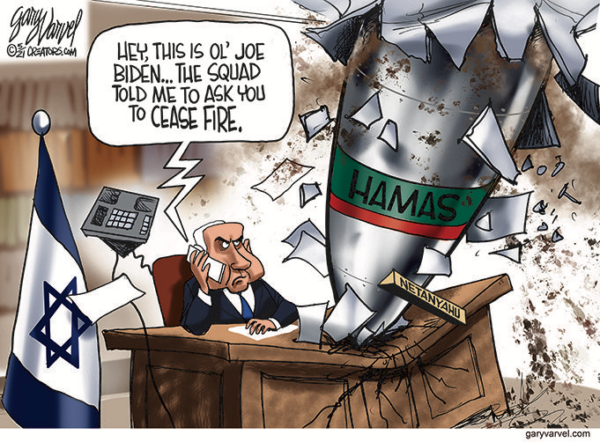The above cartoon shows the four significant obstacles to peace in the region, involving the leaders of Israel and the United States, as well as Iran and Hamas. (The North State Journal)
By Ali Hussein
As the conflict in the Middle East intensifies, a deeper analysis reveals a troubling reality: the pursuit of peace is obstructed by the desperate political maneuvers of leaders who seem more focused on personal gains than the well-being of their nations. In this expose, we shed light on the four significant obstacles to peace in the region, involving the leaders of Israel and the United States, as well as Iran and Hamas.
President Biden
- President Biden’s rejection of a ceasefire has raised eyebrows, with some speculating that electoral considerations may be at play. While the desire to appear strong on national security is not uncommon during election times, the cost of prolonging the conflict, especially considering the toll on innocent lives, raises ethical concerns. The world watches as Biden’s decision seemingly prioritizes political gains over the urgency for peace.
- PM Netanyahu
- Prime Minister Netanyahu’s refusal to entertain a ceasefire could be viewed through the lens of a leader fighting for his political survival. The looming corruption charges against him add a layer of complexity to the situation. Netanyahu’s determination to stay in power may be fueled by the realization that once the war ends, he could face legal consequences. This self-preservation strategy comes at the expense of countless lives caught in the crossfire.
Iran
- Iran’s role in the conflict cannot be overlooked. The support for groups like Hamas in Gaza reflects Tehran’s desire to maintain influence in the region. By using proxies to destabilize neighboring countries, Iran not only hampers the prospects of regional peace but also perpetuates a cycle of violence that serves its strategic interests. Genuine peace requires addressing Iran’s disruptive role.
Hamas
- Hamas, too, plays a pivotal role in obstructing peace. Its refusal to engage in meaningful dialogue prolongs the suffering of the Palestinian people. While the organization purports to fight for the rights of Palestinians, its resistance-centric approach only exacerbates the humanitarian crisis in Gaza. For lasting peace, Hamas must be willing to participate in constructive negotiations.
In conclusion, the Middle East is trapped in a cycle of conflict perpetuated by leaders clinging to power and external actors pursuing their geopolitical agendas. The desperate maneuvers of Biden and Netanyahu, coupled with Iran and Hamas’ disruptive strategies, hinder the path to peace. The international community must collectively call for a cessation of hostilities and demand that leaders prioritize the well-being of their citizens over personal and political gains. It is high time for a paradigm shift that places the pursuit of genuine peace at the forefront of regional priorities.


Leave a Reply
You must be logged in to post a comment.